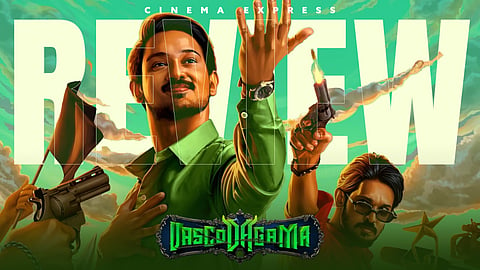Vasco Da Gama Movie Review: Sets sail for a noble expedition, loses direction midway
Vasco Da Gama(2 / 5)
The mere fact that a film creates an imaginary world to make satirical comments on current political and social happenings is sure to pique our interest. In that regard, Vasco Da Gama grabs our attention with an interesting premise and meticulous world-building. Unfortunately, the film fails to leverage its full potential. Vasco Da Gama begins with a narration about the proportion of evil and good in every age (or Yuga), according to the Hindu belief system. Shortly after telling us that high moral virtues are sparse and are on the fringes during this Kali Yuga, we are introduced to Vasudeva Krishnan (Nakkhul), who has a hard time staying good in a world where vices are of the utmost utility. In this world, you'll be sneered at if you stay clean. Whether Vasu is able to stick to his virtues or not is what the film is about.
In the film, we get to see a theatre showing the Sri Lankan Tamil genocide, a police station that arrests only the innocent, and a hospital named Naraka with a statue of satan in the reception. The joys of such a start get you engaged to a point where even a minor slack gets noticed. The trouble with Vasco Da Gama is that it goes off course and misses the central theme by a mile. First to be ranked among the badly written episodes of the film is the can-do-without romantic track. How Vasu struggles to put on a bad guy cloak to woo his lady love, while her father is hell-bent on marrying her to a loafer, could have been conveyed in a concise manner. These scenes consume an inordinate amount of screen time in a film that already has a short runtime. After painstakingly constructing an alternative universe, why should the narration go back to the tiresome how-the-boy-gets-the-girl routine?
The director seems to be in a state of confusion about whether to proceed with the social commentary or explore only the personal challenges of the lead. RGK decides to make it a son-solves-family-issue story in the second half, muddling the film's tone. It is shocking not to be able to find a single memorable performance in a film that has the likes of Nakkhul, Prem, Redin Kingsley, Munishkanth, and KS Ravikumar. The unmemorable performances could be attributed to poor writing. The unidimensional characters would have been less of a problem if more effort was put into formulating a compelling logical structure. Logic goes for a toss on many levels in this film. The disappearing Mahadevan (Prem) re-appears out of nowhere, only to disappear again. No explanation to any of these whatsoever. The second half revolves around a murder plot in a centralised prison named Vasco Da Gama. A ruthless gangster, Kovardhan (Vamsi Krishna), suddenly turns a do-gooder—a quality that will get you imprisoned—to get into prison and to settle scores. Due to confusion around the target's identity, Kovardhan is unable to figure out who his target is between two people, so the murder is delayed. When the prison system and society are going to reward the evilness in a person, why will a gangster even worry about identity confusion won't he just kill them both? Attempts to differentiate one from the other take another 20–30 minutes of runtime without tickling our bones much. When everything that leads to the climax looks contrived, we lose all hope about the climax.
Vasco Da Gama was enjoyable for its witty commentaries on current and past political events, and we wish the film could have kept its focus on that. To deviate from that and repeat the most mundane story of a hopeless romantic and a responsible son is like throwing away the wheat and retaining the chaff. The film, with all the potential for a biting satire, ends up being a forgettable affair due to its convoluted and disjointed screenplay. To place a deleted scene that features Badava Gopi and Namo Narayana when the credits roll, which was better than several other scenes in the film, is a testament to the ungainly choices the director made in the film.

